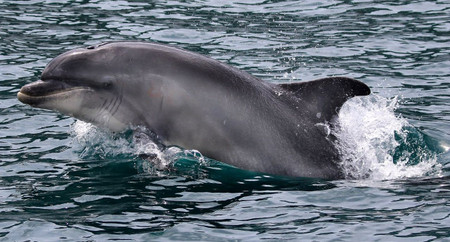Bottlenose Dolphin
True identities of Weymouth’s ‘bonnie’ dolphins discovered on a Naturetrek Day Trip – hello ‘Honey’ & ‘Whipper-Snapper’!
 By Tom Brereton
By Tom Brereton16th September 2021
Tom is a Naturetrek tour leader and a monitoring and species ecologist for Butterfly Conservation. He pursues his interest in seabirds and cetaceans as a Research Director of the charity Marinelife.
The origins of two Bottlenose Dolphins, which have spent the last two summers feeding and playing around the cruise ships in Weymouth Bay, Dorset, have finally been revealed.
In between Dorset and Scotland, the mother and calf pair have been reported as stopping off in and commuting to Cornwall. The gender of the offspring is not known and it was not given a name in Scotland, where it was born. One of the earliest confirmed sightings of the pair was from the same ‘Snapper’ charter boat back in August 2019, so perhaps a more appropriate name for this youngster is ‘Whipper-Snapper’ rather than ‘Harry’ or ‘Wills’!
'Honey’ has a smooth dorsal fin, but ‘Whipper-Snapper’ has a highly distinctive bumpy trailing edge to the dorsal fin, as the picture shows.
The east coast Scotland Bottlenose Dolphin population has been expanding its range in recent years, with some of the dolphins photographed in coastal waters from NE England to Ireland to the Netherlands and Denmark. This, though, is the first time any have been identified in the English Channel, a distance in excess of 1,400 km south through the North Sea or over 1,700 km via the Irish Sea. An incredible journey either way!

Charlie Phillips, Field Officer with Whale and Dolphin Conservation, who initially identified them using the University of Aberdeen’s Photo ID catalogue of this population said: ‘More very familiar dorsal fins seen many miles from home, thanks to Dr. Barbara Cheney from Aberdeen University’s Lighthouse Field Station who runs the dolphin ID project and catalogue for the confirmation, another two dolphins “found”.’
Naturetrek tour leader, and Research Director of the charity Marinelife, Dr Tom Brereton was leading the Day Trip in question and said, ‘I’ve been lucky to see these animals many times this year whilst taking groups out and collecting research data, but have only posted more dramatic shots on social media that haven’t shown the fins close up. Once I saw the interest the single fin shot generated on Twitter, I fired many images over to Charlie and the identities were confirmed by Dr Cheney. Having conducted photo-identification of English Channel dolphins for many years, I can say this is easily the most incredible resighting yet I have been involved with.’
Though the dolphins are famed for being seen around the cruise ships, the animals have been in Weymouth Bay since at least the summer of 2019, the year after their Scottish disappearance, with the offspring noticeably smaller back then. They were more elusive as they ranged over a wider area, then the cruise ships arrived due to the pandemic and they became a huge tourist attraction.




 Loading search...
Loading search...